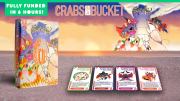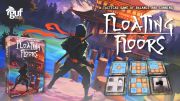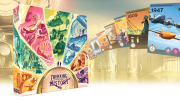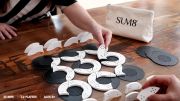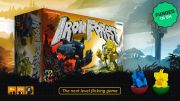Hand-to-Hand Wombat (Exploding Kittens) – You are each given a secret identify: you are either a good or a bad wombat. You then scatter bricks all around the play area and then everyone closes their eyes. The good wombats are trying to work together to build towers by stacking bricks together in the correct order, while the bad wombats are trying to mess with the towers and cause chaos. After a minute everyone opens their eyes and tries to guess who the bad wombats are. After a few rounds the good wombats must successfully complete the towers before too many good wombats are voted out of the game.
Casual Games on Kickstarter: Wombats, Crabs, and Ninjas
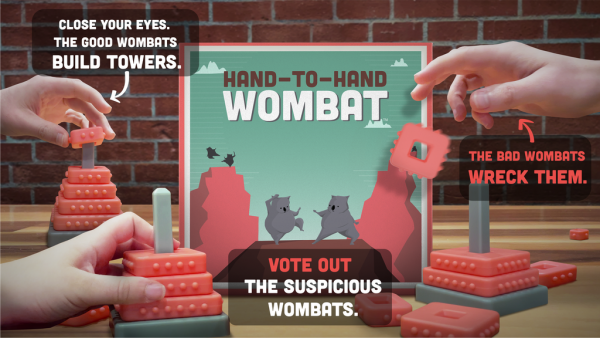
The makers of Trekking the World have a new game on Kickstarter, as does the creative team behind Exploding Kittens. There’s also a retro-inspired roll-and-write, a domino-like strategy game, and a clever dexterity game themed around ninjas. If that's not enough, there is a light take-that card game with lots of crabs and a dexterity game played on a two-level board.
Crabs in a Bucket (Blue Rondo Games) – The goal of the game is to be the first player to get rid of all your cards. There is a full deck of fifty-two cards in the regular suits and numbers. Additionally, there are seventeen joker crabs, each one with a unique ability. At the start of the game, each player starts with seven cards. The top of the draw pile is then flipped over and placed on the discard pile. At the start, you will try to match the number or the suit of that card with one of your own. When you play a non-royalty, non-joker card, you may also discard any cards of the same suit that are a higher number. After the first round, you can play a joker crab. Each one has different abilities, such as forcing each player to discard a crab card whose suit matches the card currently on top of the discard pile or draw four, or one that allows you to give cards to another player. Royalty cards of a suit have a punishment; these prevent jokers from being played while they are on top of the discard pile, and also have unique abilities while on top of the discard pile.
Floating Floors (Guf Studios) – Each player controls a ninja of a specific color. You are trying to capture your player tiles that are at different edges around the game board. The game board is made up of nine landscape tiles on top of which floor tiles will be built. Your ninja can only cross floor spaces that match your player color or stand on tokens of your player color. Each round you roll three dice, which give you three tokens to play each turn, either from the supply or from those already placed on the board. You can place tokens on any landscape space so long as it does not show water, or on a floor space (to help with balance or to cross a space in your opponent’s color). You may then balance a floor tile on top of tokens resting on a landscape space. If a floor falls on your turn, your turn immediately ends and your opponent may rearrange all the pieces in that area (both the tokens and the floor tile). When you reach one of your player tiles, you must rotate the floor tile you’re on ninety degrees before you can claim it. However, once claimed, you can use that ability on future turns to your advantage.
Trekking Through History (Underdog Games) – The game takes place over three rounds. Each round you have twelve hours to spend and each round you also choose a different itinerary card, which lists different types of historical events you want to see. On your turn you choose one of the history cards in the display. Different cards cost different amounts of time and you are also trying to go to events in chronological order. Cards will get you experience tokens in different categories to place on empty slots on your itinerary cards. If you fill a space that shows a number of points, you immediately earn those points.
Retrograde (Resonym) – Each round, all players roll their dice simultaneously, as quickly as possible, keeping those they want and rerolling those they don't. You need to move quickly, because as soon as you’re done, you grab a target card. The last player without a card has to stop rolling and choose from the cards that are left. You then mark off aliens on your player sheet, spending pairs of matching-colored dice to mark off aliens of the same colors, and only if that color alien appears on your target card. You can earn bonus points from marking off entire columns or unlock power-ups by completing rows.
SUM8 (Turnup Games) – You set the game board in the center of the table. The board is made up of nine or twelve disks, and these disks can be placed in different patterns to change the game. Each disk can hold up to four tiles. The tiles are based on dominos with either end showing a different number of pips. Players take turns playing tiles. When adding a tile to the board, you must play it so that it touches another tile already on the board, whether it is on the disk you're playing to or an adjacent one. However, instead of playing a new tile, you may choose to move a tile instead. The only tiles you cannot move are those on a disk that already has a complete set of four. When you match pips between a tile you played and one it connects to, you earn one point. If you play a tile so that one set of its pips and the pips they touch on the other tile equals eight, you earn two points. Finally, you earn four points if you complete a disk that as adjacent to another already completed disk.
Iron Forest (Brain Games) – From the designers of ICECOOL, Iron Forest is a dexterity game played on a two-level board. Players use launchers to fling their game pieces up to the top level or elsewhere onto the board, while also flicking game pieces around the board as well. Holes in the top level can cause pieces to be knocked down or fall to the level below. There are different scenarios included in the game, with different goals for the two teams to complete in order to win the game.
Disclosure: unless otherwise noted, we have not seen or played any of the above games. Our assessment of each is based on the information given on the crowdfunding project page.





